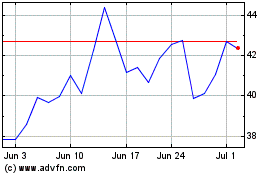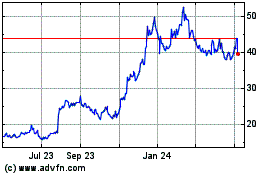Rhythm Pharmaceuticals, Inc. (Nasdaq: RYTM), a global
commercial-stage biopharmaceutical company focused on transforming
the lives of patients and their families living with rare
neuroendocrine diseases, today announced the publication of
previously disclosed results from its Phase 2 study of
setmelanotide for the treatment of hypothalamic obesity. The data
are published in the peer-reviewed journal The Lancet Diabetes
& Endocrinology.
“People with hypothalamic obesity experience rapid, severe
weight gain and hyperphagia,” said lead author Christian Roth,
M.D., Seattle Children’s Research Institute and Division of
Endocrinology, Department of Pediatrics, University of Washington.
“In this first study to investigate the use of setmelanotide as a
targeted treatment for hypothalamic obesity, we observed a
consistent reduction in body weight and hunger in all adherent
patients. We believe these findings support setmelanotide as a
potential novel and effective treatment option, and we look forward
to potentially confirming the results in the ongoing pivotal
study.”
Acquired hypothalamic obesity is a rare form of extreme obesity
that occurs following damage to the hypothalamic region of the
brain, which includes the melanocortin-4 receptor (MC4R) pathway
and is responsible for controlling physiological functions such as
hunger and weight regulation. It most frequently follows the growth
or surgical removal of craniopharyngioma, astrocytoma, or other
rare brain tumors. Patients experience rapid weight gain, a
reduction in energy expenditure, and an increase in hunger leading
to severe obesity within six to 12 months following tumor
resection.
Rhythm enrolled 18 patients in its open-label, 16-week Phase 2
trial designed to evaluate setmelanotide in acquired hypothalamic
obesity in patients with a body mass index (BMI) ≥95th percentile
(children 6 to <18 years) or ≥35 kg/m2 (adults ≥18 years). The
primary endpoint was the proportion of patients who achieved a 5%
or greater reduction in BMI after 16 weeks of treatment. Hunger was
also assessed daily, as self-reported by individual patients. As
previously disclosed, results demonstrated:
- 89% (16 of 18) of patients achieved the primary endpoint;
- 78% (14 of 18) of patients achieved a 10% or greater reduction
in BMI at 16 weeks;
- Mean percent reduction in BMI was 15% from baseline;
- In pediatric patients (n=13), the mean (standard deviation
[SD]) BMI Z score at Week 16 was 2.7 (1.3), a reduction of 1.3
(1.0) points from baseline; and
- Mean (SD) most hunger score at baseline was 6.6 (1.6), compared
with 3.7 (2.5) at Week 16, for a reduction of –2.9 (2.3) points or
45% for patients ≥12 years of age (n=11).
The publication also includes preliminary data from Rhythm’s
long-term extension of the Phase 2 study that were disclosed at
ObesityWeek® 2023. These data show patients with hypothalamic
obesity (n=12) achieved mean BMI reduction of approximately 26% at
one year on setmelanotide treatment.
Consistent with prior experience, setmelanotide was generally
well tolerated. The most common adverse events (AEs) in the primary
trial included nausea (61.1%), vomiting (33.3%), skin
hyperpigmentation (33.3%), diarrhea (22.2%), and COVID-19 (22.2%).
Two patients discontinued due to AEs and a third patient was
non-compliant. There were no serious AEs, no AEs that led to study
discontinuation during the trial, and no new safety concerns were
observed during the long-term extension trial.
In January 2024, Rhythm announced the completion of screening
for enrollment in the ongoing pivotal, Phase 3 clinical trial
evaluating setmelanotide in patients with acquired hypothalamic
obesity. The Company remains on track to obtain topline study
results in the first half of 2025.
About Rhythm PharmaceuticalsRhythm is a
commercial-stage biopharmaceutical company committed to
transforming the lives of patients and their families living with
rare neuroendocrine diseases. Rhythm’s lead asset,
IMCIVREE® (setmelanotide), an MC4R agonist designed to treat
hyperphagia and severe obesity, is approved by the U.S. Food
and Drug Administration (FDA) for chronic weight management in
adult and pediatric patients 6 years of age and older with
monogenic or syndromic obesity due to pro-opiomelanocortin (POMC),
proprotein convertase subtilisin/kexin type 1 (PCSK1) or leptin
receptor (LEPR) deficiency confirmed by genetic testing, or
patients with a clinical diagnosis of Bardet-Biedl syndrome (BBS).
Both the European Commission (EC) and the
UK’s Medicines & Healthcare Products Regulatory
Agency (MHRA) have authorized setmelanotide for the treatment
of obesity and the control of hunger associated with genetically
confirmed BBS or genetically confirmed loss-of-function biallelic
POMC, including PCSK1, deficiency or biallelic LEPR deficiency in
adults and children 6 years of age and above. Additionally, Rhythm
is advancing a broad clinical development program for setmelanotide
in other rare diseases, as well as investigational MC4R agonists
LB54640 and RM-718, and a preclinical suite of small molecules
for the treatment of congenital hyperinsulinism. Rhythm’s
headquarters is in Boston, MA.
Setmelanotide IndicationIn the United
States, setmelanotide is indicated for chronic weight management in
adult and pediatric patients 6 years of age and older with
monogenic or syndromic obesity due to POMC, PCSK1 or LEPR
deficiency as determined by an FDA-approved test demonstrating
variants in POMC, PCSK1 or LEPR genes that
are interpreted as pathogenic, likely pathogenic, or of uncertain
significance (VUS) or BBS.
In the European Union, setmelanotide is indicated for the
treatment of obesity and the control of hunger associated with
genetically confirmed BBS or loss-of-function biallelic POMC,
including PCSK1, deficiency or biallelic LEPR deficiency in adults
and children 6 years of age and above. In Europe,
setmelanotide should be prescribed and supervised by a physician
with expertise in obesity with underlying genetic etiology.
Limitations of UseSetmelanotide is not
indicated for the treatment of patients with the following
conditions as setmelanotide would not be expected to be
effective:
- Obesity due to suspected POMC, PCSK1 or LEPR deficiency
with POMC, PCSK1 or LEPR variants
classified as benign or likely benign
- Other types of obesity not related to POMC, PCSK1 or LEPR
deficiency, or BBS, including obesity associated with other genetic
syndromes and general (polygenic) obesity.
ContraindicationPrior serious hypersensitivity
to setmelanotide or any of the excipients in IMCIVREE. Serious
hypersensitivity reactions (e.g., anaphylaxis) have been
reported.
WARNINGS AND PRECAUTIONS
Skin Pigmentation and Darkening of Pre-Existing
Nevi: Generalized increased skin pigmentation and
darkening of pre-existing nevi have occurred because of its
pharmacologic effect. Full body skin examinations prior to
initiation and periodically during treatment should be conducted to
monitor pre-existing and new pigmentary lesions.
Heart rate and blood pressure
monitoring: In Europe, heart rate and blood
pressure should be monitored as part of standard clinical practice
at each medical visit (at least every 6 months) for patients
treated with setmelanotide.
Disturbance in Sexual Arousal: Spontaneous
penile erections in males and sexual adverse reactions in females
have occurred. Patients who have an erection lasting longer than 4
hours should seek emergency medical attention.
Depression and Suicidal Ideation: Depression
and suicidal ideation have occurred. Patients should be monitored
for new onset or worsening depression or suicidal thoughts or
behaviors. Consideration should be given to discontinuing
setmelanotide if patients experience suicidal thoughts or
behaviors, or clinically significant or persistent depression
symptoms occur.
Hypersensitivity Reactions: Serious
hypersensitivity reactions (e.g., anaphylaxis) have been reported.
If suspected, advise patients to promptly seek medical attention
and discontinue setmelanotide.
Pediatric Population: The prescribing
physician should periodically assess response to setmelanotide
therapy. In growing children, the impact of weight loss on growth
and maturation should be evaluated. In Europe, the prescribing
physician should monitor growth (height and weight) using age- and
sex-appropriate growth curves.
Risk of Serious Adverse Reactions Due to Benzyl Alcohol
Preservative in Neonates and Low Birth Weight
Infants: Setmelanotide is not approved for use in
neonates or infants. Serious and fatal adverse reactions including
“gasping syndrome” can occur in neonates and low birth weight
infants treated with benzyl alcohol-preserved drugs.
ADVERSE REACTIONS
Most common adverse reactions (incidence ≥20%) included skin
hyperpigmentation, injection site reactions, nausea, headache,
diarrhea, abdominal pain, vomiting, depression, and spontaneous
penile erection.
USE IN SPECIFIC POPULATIONS
Lactation: Not recommended when
breastfeeding.
To report SUSPECTED ADVERSE REACTIONS, contact Rhythm
Pharmaceuticals at +1 (833) 789-6337 or FDA at 1-800-FDA-1088
or www.fda.gov/medwatch. See section 4.8 of the Summary
of Product Characteristics for information on reporting
suspected adverse reactions in Europe.
Please see the full Prescribing Information for
additional Important Safety Information.
Forward-looking StatementsThis press release
contains forward-looking statements within the meaning of the
Private Securities Litigation Reform Act of 1995. All statements
contained in this press release that do not relate to matters of
historical fact should be considered forward-looking statements,
including without limitation statements regarding the potential,
safety, efficacy, regulatory progress, clinical design or progress,
and commercial market for any of our products or product
candidates, including setmelanotide to treat hypothalamic obesity;
and the ongoing progress of and anticipated timing for our Phase 3
clinical trial. Statements using word such as “expect”,
“anticipate”, “believe”, “may”, “will” and similar terms are also
forward-looking statements. Such statements are subject to numerous
risks and uncertainties, including, but not limited to, whether the
conditions for the closing of the investment transaction; our
ability to enroll patients in clinical trials, the design and
outcome of clinical trials, the impact of competition, the ability
to achieve or obtain necessary regulatory approvals, risks
associated with data analysis and reporting, our ability to
successfully commercialize setmelanotide, our liquidity and
expenses, our ability to retain our key employees and consultants,
and to attract, retain and motivate qualified personnel, and
general economic conditions, and the other important factors
discussed under the caption “Risk Factors” in our Annual Report on
Form 10-K for the year ended December 31, 2023 and our
other filings with the Securities and Exchange Commission.
Except as required by law, we undertake no obligations to make any
revisions to the forward-looking statements contained in this
release or to update them to reflect events or circumstances
occurring after the date of this release, whether as a result of
new information, future developments or otherwise.
Corporate Contact:David ConnollyHead of
Investor Relations and Corporate CommunicationsRhythm
Pharmaceuticals, Inc.857-264-4280dconnolly@rhythmtx.com
Media Contact:Adam DaleyBerry & Company
Public Relations212-253-8881adaley@berrypr.com
Rhythm Pharmaceuticals (NASDAQ:RYTM)
Historical Stock Chart
From Oct 2024 to Nov 2024

Rhythm Pharmaceuticals (NASDAQ:RYTM)
Historical Stock Chart
From Nov 2023 to Nov 2024
